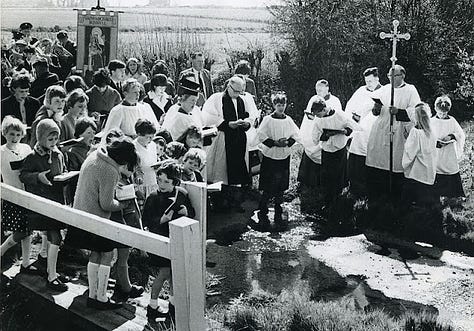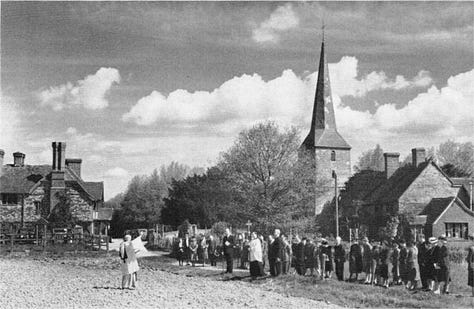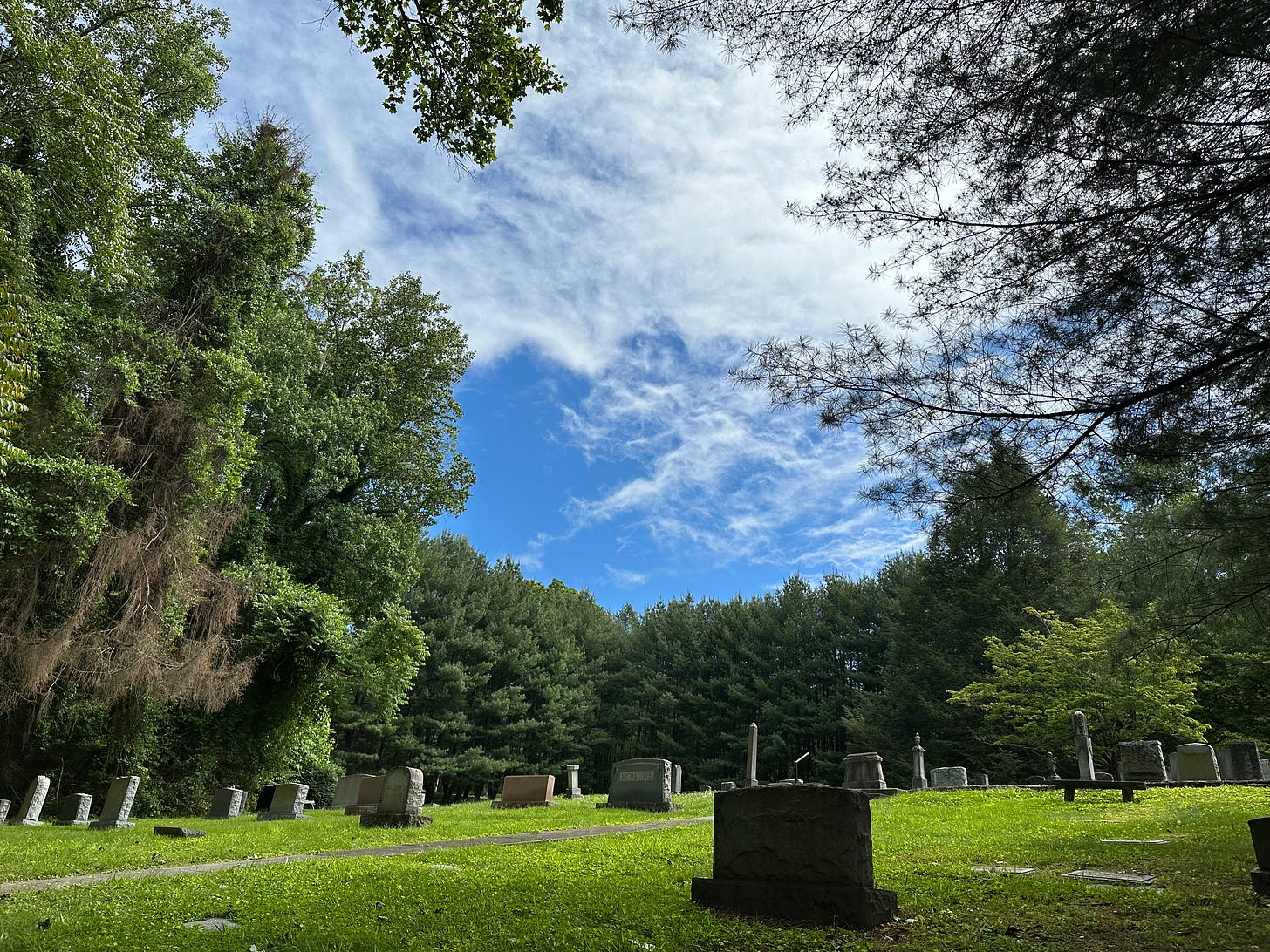rogation days
make prayer barefooted again
I intend to send this newsletter (one thought + three things I’m loving) every Tuesday. But sometimes things take the time they take. Thank you for reading.
Of course I’m a sucker for Rogation Days. I mean, look at this:



Every year in the church calendar, the Monday, Tuesday, and Wednesday before Ascension Day are Rogation Days, days in which God’s people ask for God’s blessing on the fields at planting time (rogation comes from the Latin rogatio, asking). Since the fifth century, Christians have walked the bounds of properties together, reciting a litany of prayers.
Almighty God, Lord of heaven and earth: We humbly pray that your gracious providence may give and preserve to our use the harvests of the land and of the seas, and may prosper all who labor to gather them, that we, who are constantly receiving good things from your hand, may always give you thanks; through Jesus Christ our Lord, who lives and reigns with you and the Holy Spirit, one God, for ever and ever. Amen.
There is beauty in the way this tradition reminds us of our dependence on God, our connection to the earth, and the interdependence of our lives.
And yet there is some sense in which it is plainly anachronistic; these prayers were originally said by people whose lives were ordered around agriculture, people who actually tended fields and lived with an awareness of human reliance on weather and earth for food to eat. A sheen of sentimentality can rest over the liturgy now, making it feel more nostalgic than real, like we’re doing it for the aesthetic. It’s cute: someone should make a Rogation Days as a Wes Anderson film tiktok.
The Book of Occasional Services tries to accommodate for the change in our common life by including prayers for all kinds of work, not just agricultural work, on rogation days – we have a prayer for scientists, restaurants, businesses, hospitals. And while I appreciate this, it does seem to me that broadening the meaning of these days changes them substantially – weakens them, even.
Rogation Days were originally not just days for prayer, but days of penitence in response to natural disaster.
“The story of the Rogation Days begins with St. Mamertus (d.475), a fifth-century bishop of Vienne in Gaul. In one short period of time during St. Mamertus’s episcopacy, Vienne suffered a portentous series of natural disasters: there was an earthquake, a fire burned down the town hall, and wild deer made an incursion into the town. In response to these disasters, St. Mamertus ordered the faithful of Vienne to make three successive processions on the Monday, Tuesday, and Wednesday before the feast of the Ascension, in which they were to do penance and to ask God for deliverance from their troubles, singing psalms and responses, and stopping at various churches on their route.”1
The annual observance of Rogation Days spread out from Vienne, in every place uniformly solemn and penitential. The text of the Council of Mainz of 813 notes that those attending the rogation litany were to walk, not ride horseback, and were to attend barefoot, in sackcloth and ashes, not wearing fine clothes.2
The Catholic church also celebrates a Rogation Day on April 25. One of the prayers historically used on that day is the Sevenfold Litany that was created by Pope Gregory during a horrific round of Bubonic Plague. Here he is saying:
“For it behoves us to consider, beloved, how many ongoing calamities we are afflicted by on account of our sins, and how the medicine of God’s concern for us might reach us to help us.”3
In both of these historical touchstones, then, natural crisis and penitence are at the root of Rogation Days.
We have, in our continued practice of rogation days, emphasized one part of their history and meaning: we are still asking God to bless our work (even when it’s not in farms and fields). But we have neglected this older, deeper spur; and in a moment when our disconnection from the greater-than-human world and our greed and anthropocentrism are killing off species, overheating the oceans, and forcing people from their homes, mightn’t a return to the penitential roots of rogation days be appropriate?
We should walk barefoot when we pray, feeling our connection to the soil that we’re made of.
We should wake ourselves up to our local natural disasters, the ones we might not see if we stay sequestered in our air-conditioned lives, and repent of our sin, our ignorance, our (if unwitting) complicity.
For me, in Asheville, maybe an appropriate rogation walk would be to the neighborhood most vulnerable to landfills and “brownfields” – properties that could house hazardous substances, pollutants, and contaminants. That neighborhood (which, actually, I do walk through every week) is a neighborhood that is 56% Black or biracial, and it has 25 brownfields. Move a mile or two over, where the neighborhood is only 6% Black, and there isn’t a single brownfield. This is not coincidence.
Or, I could do a little farther afield, and pray at one of the hog farms in eastern North Carolina.
The reality of human abuse of creation, and the effects we’re feeling now, makes me despair sometimes. But it ought instead to invite me to repent. Because of human sin, the land mourns (Hosea 4:3) and all creation awaits renewal (Rom 8:19). But who knows? If we repent, perhaps God will turn and leave a blessing, a blessing of crops: grain and wine that we can then offer back to God (Joel 2:14).
A postscript: My church did not celebrate the rogation days this year — they fell just after our Bishop’s visit, and a glorious Sunday of 50 (fifty!) confirmations and baptisms and receptions and reaffirmations, and our calendar was simply too full. We did, however, celebrate Earth Day in collaboration with the other two downtown churches on Church St. Sometimes I think about the fact that two thousand years ago Romans celebrated Robigalia on April 25, sacrificing a dog to protect their wheat fields from disease; and fifteen hundred years ago Christians started prayer walks of repentance on April 25 to protect their wheat fields from disease; and fifty years ago, Americans started celebrating Earth Day on April 22, a political and educational event with no transcendent ties… and I feel a sense of gratitude for that day, but also a sense of loss.
Three things:
My best friend made this roast chicken for me last week, and, as long as I can scrounge up some tarragon, I am making it again tonight.
I highly recommend regular tea dates with your octogenarian friends. At tea this week, mine told me about planting cinnamon fern, which the bluebirds are using to build their nests; and the novel The Tall Woman by Wilma Dykeman; and these tea towels, with handprinted watercolor designs, produced in Asheville.
It’s always the right time to take a walk through a cemetery.
Where Goodness Still Grows is available wherever books are sold. My first book, Dangerous Territory, has a second edition coming out this fall; read more here!
https://adoremus.org/2022/04/be-careful-what-you-dont-ask-for-why-the-rogation-days-still-matter/
Paleotimus (op. cit.), Part 2, Book XIII, chapter I, p. 381, cited in the above article
I don’t read this as “you’re sick because you sinned, so if you repent you will be healed” — I read it as an admission that all life is intertwined, and our sins have effects on each other and all creation of which we have no knowledge. But we can ask for mercy and God is eager to grant it.




A great read — I didn’t really know much about Rogation Days before. And your newsletter is always a welcome sight in the inbox, no matter which day it arrives! 😊